SRA Commentary: Dial ''M'' for money
SRA Commentary: Dial ''M'' for
money
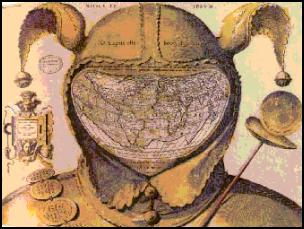
By Chris
Sanders
March 1, 2004
© 2003-5. Sanders Research Associates. All rights reserved.
Between 1945 and 1947 the gold bullion recovered…was discretely moved by ship to 176 accounts at banks in 46 countries.
- Ray Cline, former deputy director of the Central Intelligence Agency[i]
Look where your own feet stand
- Zen master Obaku
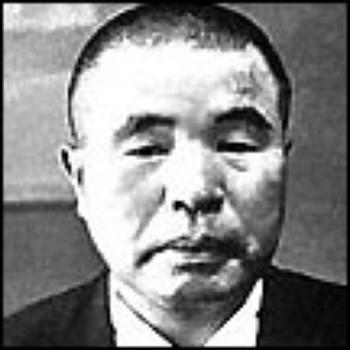
M fund bagman, Class A war
criminal,
Asia's premier racketeer and narcotics
peddler,
CIA operative: General Kodama
Yoshio
The Tokyo-Washington
Axis
The close alliance between Japan and the United States has frequently been the subject of comment in these pages over the years. Observable in facts, such as the American garrisons in Okinawa, and in deeds such as the dispatch of Japanese troops to Iraq, this alliance is one of the closest, if not the closest, of the constellation of bilateral American military, political and economic relationships around the world. On the face of it, it is also one of the most puzzling. In orthodox economic terms Japan, the world’s biggest creditor and industrial powerhouse, should be in a position to steer its own course. America, the world’s biggest debtor, is deindustrialising rapidly, even as it spends more and more on its bloated and inefficient military. One might think that the Japanese government would think twice about funnelling more and more national treasure into the American sinkhole. Yet in fact they are doing so, and have committed themselves to doing so as a matter of national policy, a policy reiterated with some forcefulness at the recent G7 economic summit in Boca Raton.
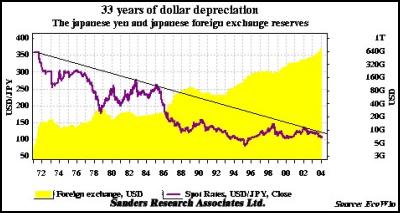
Click For Big Version
The markets are clearly confused about this; witness last week’s sharp rally in the dollar, which has moved very fast to nearly Y110 as disappointed and bruised dollar shorts have liquidated positions. Faced with an immovable Bank of Japan which spent $69 billion in January alone to support the dollar a capitulation by the shorts is as inevitable as the rising sun. One is reminded of the markets’ attempt to short the French franc in the run up to the launch of the euro several years ago. Faced with an equally immovable Bundesbank, the franc shorts were taught a valuable lesson which has clearly not been absorbed. Dogmatic economic fundamentalism is a poor reason to risk money in a closed and monopolised market. Shorting the franc against the deutschemark was never going to work because the deutschemarks that the Bundesbank created and the francs that it absorbed were all going to turn into euros in a transaction that made all the buying and selling a wash. The real trade at the time was not to sell one proto-euro for another, but to sell them both against the dollar, as the first two years of the euro’s life were to subsequently show.
Money Incorporated
That triumph of realpolitik over intellectual abstraction is worth remembering today, as dollar yen sales are taking place in a similarly closed system, which for convenience we shall call Money Incorporated. Economic dogmatists quite naturally look at the rape of America’s economy and conclude that they would rather put their money somewhere else. They are applying, however, an equilibrium framework of analysis based on a model of interaction between states that assumes that states behave as neutral regulators in the exchange of goods, services and money. The model assures this behaviour by making a further assumption that states have to behave this way because of the accountability inherent in a further abstraction, democracy.
Sadly, Money Incorporated does not work this way. Its model is Las Vegas. It does not assume that the state (in Las Vegas the “house”) act as a neutral enforcer. Rather, the state, like the house, is an active participant that works to maximise return for the people who control it. At the micro level this means that the state must force or cajole everyone into playing by its rules just as the house in Las Vegas identifies those players with a system, say for playing blackjack, and prevents them from playing. At the macro level neither the state nor the house has an interest in returns on investment for the community at large. Las Vegas is happy to divert most of the water from the Colorado watershed to fill the artificial pools and fountains and to ultimately evaporate with the approval of the State of Nevada and the Federal government. Meanwhile the citizens of the desert city of Las Vegas are forced by the house to live with water rationing, and farmers downstream can just stuff it. The cost of this is borne by the generations of taxpayers from all over the country who have financed the engineering works that make this uneconomic use of resources possible.
Money Incorporated has ensured that everyone has to play in its casinos by removing choice. This it has done by forcing all the national players to join the IMF, thanks to which they all have to accept dollars as reserve assets. This puts Money, Inc. in the enviable position of being able to exchange paper for real assets. And it transforms the national players from players into enforcers for Money Inc. to ensure that their citizens patiently endure the exchange of publicly owned real assets for inflated paper in much the same fashion that the citizens of Las Vegas endure water rationing or the citizens of Japan endure the looting of their savings in their post office gyro accounts. Here in Britain there are the examples of the privatisation of the national railway system and the sale of the Inland Revenue’s land and buildings, amongst many others.
Reasonable people can and do protest that analysis like this is “conspiracy theory.” We prefer to think of it as a more holistic approach to analysis. Economists, political scientists and public servants are, in our experience, the most prone to such protests, as we at SRA can attest from bitter experience. Being right is no guarantee of payment. We have been fired more than once for precisely that reason. The truth is, however, that conspiracy theory is the refuge to which ignorance flees when confronted with unpalatable knowledge; the great weakness of modern economics is its abhorrence of politics and the weakness of political science the conceit that it is science. The compartmentalisation of knowledge is the first step to turning those that pursue it into propagandists rather than teachers, and citizens into subjects.
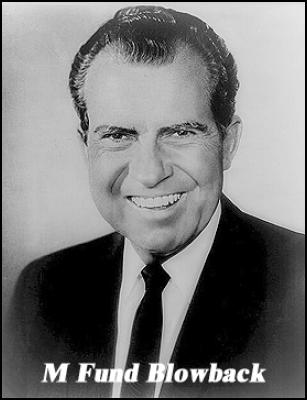
Rockefeller and Morgan, secret agents
A problem with a holistic approach to political economy is quite simply that it is hard to get a grip on the necessary facts in a timely fashion. For example, today we know that John D. Rockefeller and J. P. Morgan were, quite apart from being industrialists and financiers, superb covert operatives. Rockefeller successfully monopolised the refining industry in the US by secretly concluding rebate agreements with the railways to ensure that his product got to market more cheaply than his competition, who never know what hit them until it was too late. If that did not work then bribery and sabotage would do the trick.[ii] Morgan, for his part, was a master of the exchange of inflated paper for real assets. In an era when gold was money and the government issued debt backed by gold, Morgan milked the Treasury repeatedly by buying up government debt. When the Treasury ran low on gold, he would force a new issue of debt at a deep discount in exchange for replenishing the government’s coffers and the cycle would start all over again.[iii] This could not and did not happen without collusion and conspiracy.
However those events occurred a hundred years ago and are comfortably preserved in unread books like the specimens in a natural history museum where the carnivores titillate but do not frighten thanks to the impenetrable barrier of death. As death serves to domesticate dinosaurs, economic dogmatism serves to protect us from facing the real carnivores in the economy. Libertarian fundamentalism comfortably extols the benefits of the gold standard and private property, asserting an imaginary “stability” that is totally absent from the historical record. Marxist determinism has led more than one intellectual to acquiesce in the cartelisation of the American economy, a “necessary” step on the way to the dictatorship of the proletariat.[iv] More than a century on, we are still waiting for the dictatorship of the proletariat and social justice. That is the real reason that the Soviet Union collapsed, not the triumph of free markets. Both of these widely divergent ways of looking at the world share a common basis: both extrapolate to general from local truths with scant regard for empirical evidence. Capitalism has no such problem. As authoritarian in its political manifestation as any dictatorship in history, it has never promised justice and hence is not expected to provide it. It is highly pragmatic and deeply empirical, it being wholly unnecessary generalise a deeper meaning from the immediate problem of making money. The politicians whom it suborns to its service are as expendable as are the ones that oppose it. This is why it is comfortable on all sides of the political divide; why Wall Street and City bankers could finance Trotsky’s return to Russia in 1916 and why they could with equal aplomb provide the funds that launched National Socialism in Germany.[v]
Treasure Island
The problem before us here is to understand why the major powers are behaving as they are when a conventional economic, political, and market analysis suggests that they should behave otherwise. The answer, we think, is a simple one. They can. The reason for this is at once complex and basic. It is complex because the interacting political alliances and resources that make it possible are covert, international and historical. And it is basic because the foundation of those covert alliances is a shared interest in power.

With the Axis defeat in 1945, the United States came into possession of vast amounts of treasure: literal, tangible treasure. Under the inspiration of Secretary of War Henry Stimson, and originally negotiated as a covert addendum to the Bretton Woods Treaty, the US set up a global political action fund known informally as the Black Eagle Trust which was used, among other things, to help finance the covert war against the left in France, Italy, Greece and elsewhere. It was funded with Axis war loot and managed by the Exchange Stabilisation Fund, meaning that it was beyond Congressional scrutiny.[vi]
In the Far East, Japanese war booty was immense. One reason for this was that Asian communities shunned official banking channels as a means to preserve wealth and avoid taxation, preferring to store it themselves. The black economy was so large that it was in many respects the “real” economy. When the Japanese looted a country as they did in Korea or occupied China, much of what they seized went unremarked precisely because it did not officially exist. Also, they had more time.
With patience and determination, the Japanese hid much of their war booty in the Philippines, and of course much of it, especially that from Korea and China which predated the Second World war proper, went to the home islands. Officially, none of this was recovered. Officially, Japan ended the war broke and totally devastated. So broke, supposedly, that the United States, over the objections of its allies (notably the luckless British), inserted a clause into the official peace treaty of 1951 which foreswore any obligation on the part of the Japanese in perpetuity to pay compensation or reparations to the victims of Japanese aggression.
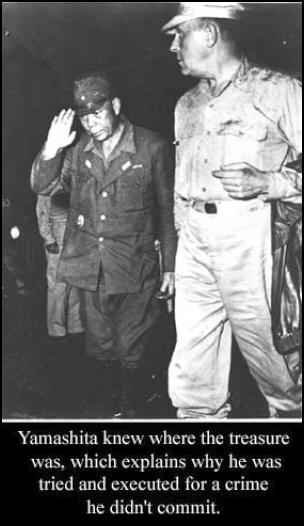
Pirates of the Pacific
Much of that war booty has in fact been recovered. In Japan it was used to finance America’s campaign against the left, which in practice meant the creation of the LDP from two right wing parties controlled by the same people who conceived and ran Japan’s war effort. As they did in Europe, the Americans found organised crime to be congenial partners. Japanese gangsters had, after all, organised the looting of occupied Asia and run the biggest international narcotics business in the world from occupied Manchuria. It was a simple matter of shared interest to do a deal after the war. And the man to do it was General Kodama Yoshio, yakuza godfather, architect of Tokyo’s narcotics export industry, class A war criminal, and after his release from prison in 1947, CIA operative.
The covert fund that the CIA used to finance its subversion of Japanese politics became known as the M Fund. In 1960 Vice President Richard Nixon did a deal with the LDP’s leadership. Kick back enough of the M Fund to help him win the presidency and they could have it under their sole control as well as Okinawa. They kept their bargain and he kept his. Since then, control of that money has been the key to leadership of the LDP and through it the leadership of Japan. Said to have been worth $35 billion in 1960, it is now said to have grown to $500 billion.[vii]
Do you wonder where the resources to suppress the price of gold come from? Do you wonder why and how the Japanese would move heaven and earth to support the dollar? Are you perplexed about the sudden advent of a war on terror? Do you find the behaviour of the British government hard to understand? Do you ask yourself why, in a world of supposedly free markets, that access to oil cannot depend on the markets and must instead be assured by war?
Conspiracy theory? Rubbish. The answers to those questions are actually very simple. And the way to control your risk is to not bet against the house, which is to say against Murder (oh, so sorry, Money) Incorporated.
- Chris Sanders
[i] Sterling & Peggy Seagrave, 2003. Gold Warriors, London, Verso. ISBN 1-85984-542-8. p.4.
[ii] For a convenient reference see www.ctaponline.org Who were the robber barons?
[iii] Gustavus Meyers, 2002. History of the Great American Fortune, Volume 3. Honolulu, University Press of the Pacific, reprint of the 1910 edition. ISBN 1-4102-0342-5.
[iv] Gustavus Meyers is himself an excellent example. Meyers excoriated the middle classes and small businessmen whom he saw as employing the same methods as the great magnates but with less success and more hypocrisy.
[v] For extensive documentation and detailed analysis Antony Sutton’s work is perhaps the most extensive relating to the role of Western finance in covert support of both Fascism and Communism.. See Antony Sutton, Wall Street and the Bolshevik Revolution, 1974. Wall Street and the Bolshevik Revolution. Cutchogue, N.Y., Buccaneer Books. ISBN 0-89968-324-X and Sutton, 1976. Wall Street and the Rise of Hitler, Seabeach, Ca., ’76 Press. ISBN 0-89245-004-5 and Sutton, 1986. The Best Enemy Money Can Buy. Billings, Montana, Liberty House Press.
[vi] Sterling & Peggy Seagrave, 2003. Gold Warriors, London, Verso. ISBN 1-85984-542-8. Chapters 7-9 and Chrisrtopher Simpson, 1988. Blowback, London, Weidenfeld & Nicolson. ISBN 0-297-79457-4. pp. 89-94.
[vii] Seagrave, p.6.
© 2003-5. Sanders Research Associates. All rights reserved.


 Eugene Doyle: Writing In The Time Of Genocide
Eugene Doyle: Writing In The Time Of Genocide Gordon Campbell: On Wealth Taxes And Capital Flight
Gordon Campbell: On Wealth Taxes And Capital Flight Ian Powell: Why New Zealand Should Recognise Palestine
Ian Powell: Why New Zealand Should Recognise Palestine Binoy Kampmark: Squabbling Siblings - India, Pakistan And Operation Sindoor
Binoy Kampmark: Squabbling Siblings - India, Pakistan And Operation Sindoor Gordon Campbell: On Budget 2025
Gordon Campbell: On Budget 2025 Keith Rankin: Using Cuba 1962 To Explain Trump's Brinkmanship
Keith Rankin: Using Cuba 1962 To Explain Trump's Brinkmanship